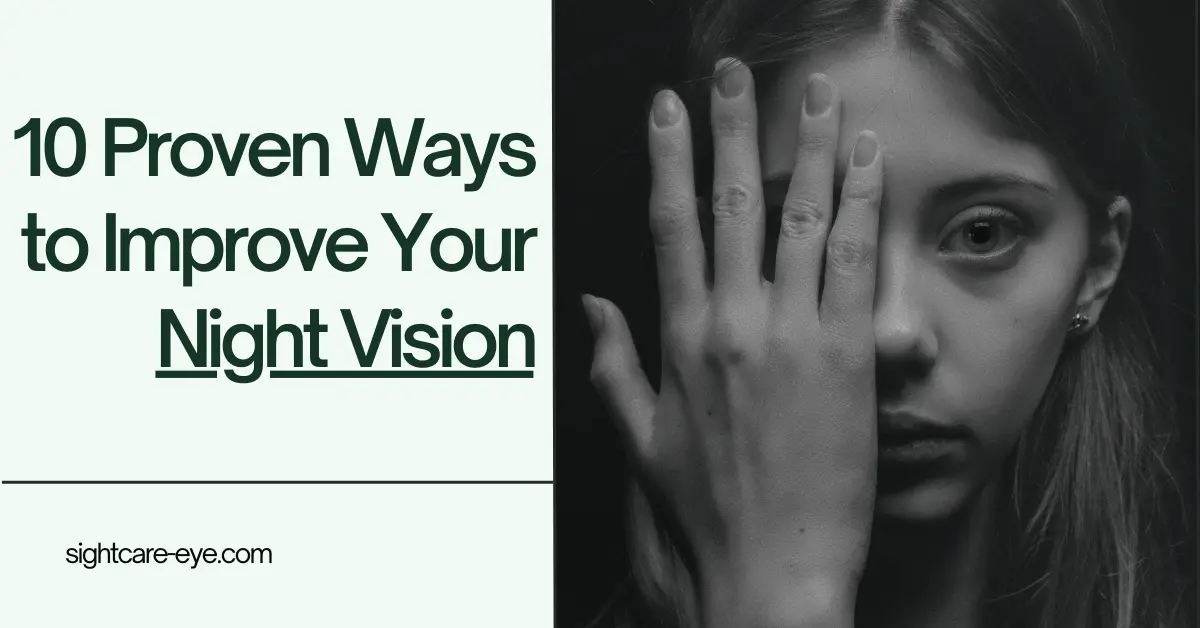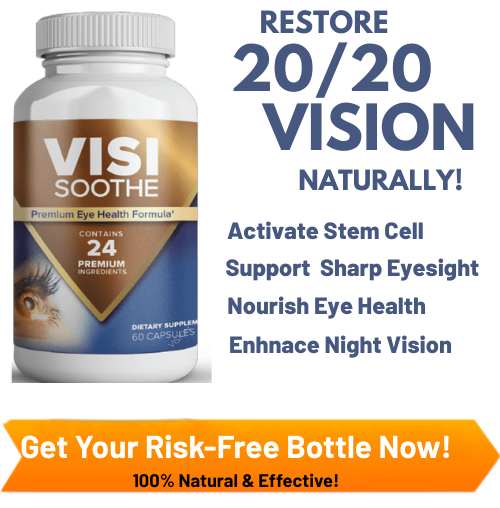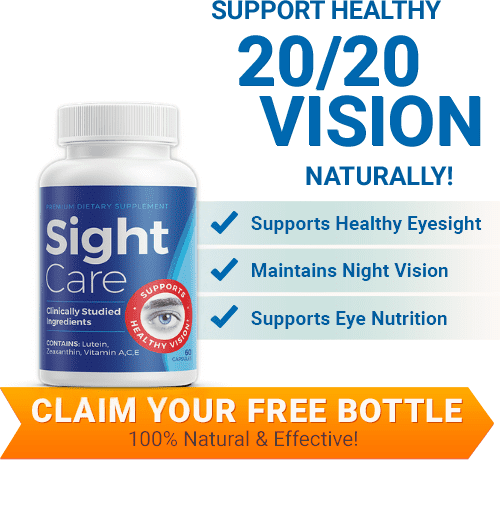Having strong night vision is essential for a wide range of everyday activities. Whether you're driving home after work, enjoying an evening hike, or simply trying to navigate your home in the dark, good low-light visual acuity is crucial for safety and independence.
Unfortunately, many people experience a gradual decline in their night vision as they get older. This is often due to a combination of factors, including vitamin deficiencies, age-related eye conditions, and lifestyle habits that can damage the eyes over time.
The good news is that there are several proven, natural methods you can use to improve night vision. In this article, we'll explore 9 science-backed strategies you can use to boost your eyes' light-adapting abilities and regain the sharp, clear vision you enjoyed in your younger years.
1. Eat Foods That Improve Night Vision
Proper nutrition is the single most important factor in your eyes' ability to see in the dark. Certain vitamins and antioxidants play a direct role in how your retina functions in low-light conditions. The two most crucial nutrients are Vitamin A and antioxidants like Lutein and Zeaxanthin.

What vitamin helps night vision?
Unquestionably, it's Vitamin A. This essential vitamin is a critical component of rhodopsin, a pigment in your eye's rod cells that is responsible for absorbing light. Without enough Vitamin A, your eyes cannot produce the rhodopsin needed to see clearly in the dark.
Here are the best foods that improve night vision, broken down by the key nutrients they provide:
|
|---|
By incorporating these foods into your diet, you provide your eyes with the specific building blocks they need to function optimally in dim lighting. For a more detailed look at how diet impacts overall eye health, see our list of the top 15 foods for improving eyesight

2. Limit Blue Light Exposure
One of the biggest modern threats to healthy night vision is the constant blue light from digital screens. This high-energy light can disrupt your eyes' natural light/dark adaptation process, making it much harder for them to adjust to low-light conditions.

To combat this, take these steps:
- Wear blue light filtering glasses when using digital devices.
- Use "Night Mode" or adjust display settings on your devices to reduce blue light emissions in the evening.
- Avoid using screens for at least 1-2 hours before going to sleep.
3. Practice Dark Adaptation Exercises
You can train your eyes to adapt to darkness more efficiently. This process, known as dark adaptation, is when your retina's rod cells produce more of the light-sensitive pigment rhodopsin.

This helps improve the speed of your eyes' light/dark adaptation response. Unlike trendy 'vision hacks' that promise instant results, these exercises are based on the real science of how your eyes work. Learn more about which vision tricks are real and which are myths in our full guide
4. Improve Blood Flow to the Eyes
Your retina requires a constant supply of oxygen-rich blood to function. Impaired circulation can directly lead to reduced night vision.
5. Get Enough Quality Sleep
Your eyes undergo critical restorative processes during sleep. Specifically, your retina replenishes its supply of rhodopsin. Lack of sleep disrupts this process, leading directly to impaired dark adaptation and reduced night vision. Aim for 7-9 hours of quality sleep per night.
6. Stay Hydrated
Dehydration can negatively impact your eyes by reducing tear production (causing dry eyes), impairing visual clarity, and slowing down your pupils' ability to respond to changes in light. Aim for at least 8 cups (64 ounces) of water daily to keep your eyes well-lubricated and functioning at their best.
7. Manage Underlying Eye Conditions
Persistent night vision problems can be a symptom of an underlying eye condition.
- Cataracts: A clouding of the lens that scatters light, causing glare and reduced night vision.
- Glaucoma: Damages the optic nerve and can affect peripheral vision.
- Macular Degeneration: Affects the central, high-resolution part of your vision.
If you have persistent issues, schedule a comprehensive eye exam. While these tips are specific to night vision, overall eye health is crucial. For broader techniques to improve daytime clarity, see our complete guide on getting your 20/20 vision back naturally.
8. Avoid Smoking and Excessive Alcohol
Both of these habits are detrimental to eye health. Smoking is a major risk factor for cataracts and macular degeneration. Heavy alcohol use can impair pupil function and slow down the dark adaptation process. Cutting back or quitting is one of the best things you can do for your eyes.
9. Consider Specialized Night Vision Supplements
While food should always come first, supplements can provide a therapeutic dose of key nutrients. Look for a high-quality supplement that contains a blend of the compounds mentioned in the food section:
Some of the key ingredients found in effective night vision supplements include:
- Bilberry: For its antioxidant and blood-flow-enhancing properties.
- Lutein and Zeaxanthin: To protect the macula and improve contrast sensitivity.
- Vitamin A: To ensure your body has what it needs to produce rhodopsin.
- Enhance the eyes' dark adaptation process
- Improve contrast sensitivity and visual acuity in low light
- Protect against age-related eye diseases that compromise night vision
- Reduce the impact of factors like blue light exposure and oxidative stress
By incorporating these strategies, you can take a proactive, holistic approach to improve your night vision and maintain your visual independence for years to come.
Conclusion
In this guide, we've explored a comprehensive set of natural strategies you can use to enhance your night vision and maintain sharp, clear visual performance in low-light conditions. By incorporating these methods into your lifestyle, you can help support the eyes' light-adapting abilities and reduce the impact of factors that can compromise your low-light visual acuity.
The key steps include:
- Reducing blue light exposure
- Optimizing your diet with vision-supporting nutrients
- Practicing dark adaptation exercises
- Improving blood flow and oxygen delivery to the eyes
- Getting enough high-quality sleep
- Staying properly hydrated
- Managing any underlying eye conditions
- Avoiding smoking and excessive alcohol consumption
- Using specialized night vision supplements
Implementing these strategies consistently is crucial for achieving the best results. Remember, improving night vision is not a one-time fix - it requires ongoing effort and commitment to your eye health.
By taking a proactive, holistic approach to supporting your visual system, you can help ensure your eyes continue to function at their best, even as you age. With sharper low-light visual acuity, you'll be able to enjoy greater independence, safety, and quality of life, whether you're driving at night, stargazing, or simply moving around your home in the dark.
Prioritize your eye health today, and experience the transformative power of clear, confident night vision.
Frequently Asked Questions (FAQs)
How can I improve my night vision?
To improve your night vision naturally, try these strategies:
- Reduce exposure to blue light from screens and bulbs
- Eat a diet rich in eye-healthy nutrients like lutein, zeaxanthin, and vitamin A
- Practice dark adaptation exercises to help your eyes adjust to low light
- Stay hydrated and get enough sleep
- Manage any underlying eye conditions with the help of an eye doctor
What foods improve night vision?
Certain foods can help boost your night vision by providing essential nutrients for eye health:
- Leafy greens like spinach and kale contain lutein and zeaxanthin to protect the macula
- Fatty fish like salmon are rich in omega-3s and vitamin D to support retinal function
- Citrus fruits and bell peppers are high in vitamin C, which helps maintain corneal health
- Carrots and sweet potatoes are excellent sources of vision-boosting vitamin A
How can a healthy diet help with night vision?
Eating a nutrient-rich diet can significantly improve your night vision in several ways:
- Provides antioxidants to protect the eyes from oxidative damage
- Supplies essential vitamins and minerals for proper eye function and light adaptation
- Promotes healthy blood flow to deliver oxygen and nutrients to the retina
- Helps maintain the structural integrity of the cornea, lens, and other eye tissues
By meeting your body's nutritional needs, a healthy diet supports overall eye health and enhances your ability to see clearly in low-light conditions.
What vitamin helps improve night vision?
Vitamin A is one of the most important vitamins for supporting night vision. It plays a crucial role in the production of rhodopsin, a light-sensitive pigment found in the retina's rod cells. Vitamin A helps the eyes adapt to darkness and improves low-light visual acuity. Foods rich in vitamin A, like carrots, sweet potatoes, and leafy greens, can help boost your night vision naturally.
How to get better night vision?
Common causes of diminished night vision include aging, vitamin A deficiency, cataracts, and certain eye diseases. Addressing underlying issues through supplements, diet, and lifestyle changes can help restore night vision. Consulting an eye doctor is also recommended to rule out any medical conditions.
What supplements improve night vision?
Certain supplements can help support and improve night vision, including:
- Bilberry - Contains antioxidants that enhance blood flow and protect the eyes
- Lutein and zeaxanthin - Carotenoids that filter blue light and improve contrast sensitivity
- Alpha-lipoic acid - A powerful antioxidant that can stimulate adult stem cell production to repair the eyes
- Omega-3 fatty acids - Help maintain the structural integrity of the retina and optic nerve
Look for a high-quality night vision supplement that combines these and other vision-supporting nutrients for optimal results.
Disclaimer: The information presented in this blog post is intended for informational purposes only and should not be considered medical advice. While we strive to provide accurate and up-to-date information, it is not a substitute for professional medical guidance. Always consult with a qualified healthcare professional before making any decisions related to your health or treatment.
We strongly encourage you to seek the advice of a physician or other qualified healthcare provider with any questions you may have regarding a medical condition or treatment. Never disregard professional medical advice or delay seeking treatment because of something you have read in this blog post.
You Might Also Like..
VisiFlora Reviews (2026): Honest Analysis, Ingredients & Verdict
Stem Cell Vision Restoration: The Truth About Stem Cells and Eye Health
The Best Eye Vitamins for Seniors: A Science-Backed Guide
Vista Clear Review: Does This Aboriginal-Inspired Formula Really Work?
EyeFortin Review: Does This Formula Really Help with Eye Fortification and Clarity?
VisiSharp Review (2025): A Critical Look at the Science and Claims



